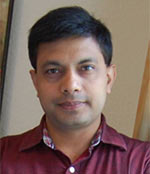Jul
07

Date: 7 July 2023
Time: 1:30 PM ET (New York Time)
Speaker(s): Dr. Kumar Vijay Mishra
Abstract
Beamforming is a signal processing technique to steer, shape, and focus an electromagnetic wave using an array of sensors toward a desired direction. It has been used in several engineering applications such as radar, sonar, acoustics, astronomy, seismology, medical imaging, and communications. With the advent of multi-antenna technologies in, say, radar and communication, there has been a great interest in designing beamformers by exploiting convex or nonconvex optimization methods. Recently, machine learning is also leveraged for obtaining attractive solutions to more complex beamforming scenarios. This webinar is the outcome of our recently published article in the 75th-anniversary special issue of the IEEE Signal Processing Magazine, wherein we capture the evolution of beamforming in the last twenty-five years from convex-to-nonconvex optimization and optimization-to-learning approaches. It provides a glimpse into these important signal processing algorithms for a variety of transmit-receive architectures, transmission zones, propagation paths, and multi-disciplinary applications.
Note: Joint work with Ahmet M. Elbir (University of Luxembourg), Sergiy A. Vorobyov (Aalto University), and Robert W. Heath, Jr. (North Carolina State University).
Biography
 Kumar Vijay Mishra (S’08-M’15-SM’18) obtained the Ph.D. in electrical engineering and the M.S. degree in mathematics from The University of Iowa in 2015, and the M.S. degree in electrical engineering from Colorado State University in 2012, while working on NASA’s Global Precipitation Mission Ground Validation (GPM-GV) weather radars. He received his B. Tech. summa cum laude (Gold Medal, Honors) in electronics and communication engineering from the National Institute of Technology, Hamirpur (NITH), India in 2003.
Kumar Vijay Mishra (S’08-M’15-SM’18) obtained the Ph.D. in electrical engineering and the M.S. degree in mathematics from The University of Iowa in 2015, and the M.S. degree in electrical engineering from Colorado State University in 2012, while working on NASA’s Global Precipitation Mission Ground Validation (GPM-GV) weather radars. He received his B. Tech. summa cum laude (Gold Medal, Honors) in electronics and communication engineering from the National Institute of Technology, Hamirpur (NITH), India in 2003.
He is currently Senior Fellow at the United States Army Research Laboratory (ARL), Adelphi; Technical Adviser to Singapore-based automotive radar start-up Hertzwell and Boston-based imaging radar startup Aura Intelligent Systems; and honorary Research Fellow at SnT - Interdisciplinary Centre for Security, Reliability and Trust, University of Luxembourg. Previously, he had research appointments at Electronics and Radar Development Establishment (LRDE), Defence Research and Development Organisation (DRDO) Bengaluru; IIHR - Hydroscience & Engineering, Iowa City, IA; Mitsubishi Electric Research Labs, Cambridge, MA; Qualcomm, San Jose; and Technion - Israel Institute of Technology.
Dr. Mishra is the Distinguished Lecturer of the IEEE Communications Society (2023-2024), IEEE Aerospace and Electronic Systems Society (AESS) (2023-2024), and IEEE Future Networks Initiative (2022). He is the recipient of the IET Premium Best Paper Prize (2021), U. S. National Academies Harry Diamond Distinguished Fellowship (2018-2021), American Geophysical Union Editors' Citation for Excellence (2019), Royal Meteorological Society Quarterly Journal Editor's Prize (2017), Viterbi Postdoctoral Fellowship (2015, 2016), Lady Davis Postdoctoral Fellowship (2017), DRDO LRDE Scientist of the Year Award (2006), NITH Director’s Gold Medal (2003), and NITH Best Student Award (2003). He has received Best Paper Awards at IEEE MLSP 2019 and IEEE ACES Symposium 2019. He is Chair (2023-present) of the Synthetic Apertures Technical Working Group of the IEEE Signal Processing Society (SPS) and Vice-Chair (2021-present) of the IEEE Synthetic Aperture Standards Committee, which is the first SPS standards committee. He is the Vice Chair (2021-2023) and Chair-designate (2023-2026) of the International Union of Radio Science (URSI) Commission C. He has been an elected member of three technical committees of IEEE SPS: SPCOM, SAM, and ASPS, and IEEE AESS Radar Systems Panel. Since 2020, he has been Associate Editor of IEEE Transactions on Aerospace and Electronic Systems, where he was awarded Outstanding Editor recognition in 2021. He has been a lead/guest editor of several special issues in journals such as IEEE Signal Processing Magazine, IEEE Journal of Selected Topics in Signal Processing, and IEEE Journal on Selected Areas in Communications. He is the lead co-editor of three upcoming books on radar: Signal Processing for Joint Radar-Communications (Wiley-IEEE Press), Next-Generation Cognitive Radar Systems (IET Press Radar, Electromagnetics & Signal Processing Technologies Series), and Advances in Weather Radar Volumes 1, 2 & 3 (IET Press Radar, Electromagnetics & Signal Processing Technologies Series). His research interests include radar systems, signal processing, remote sensing, and electromagnetics.
